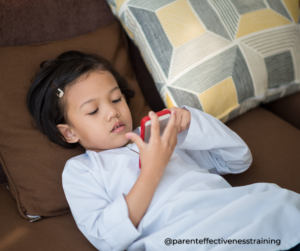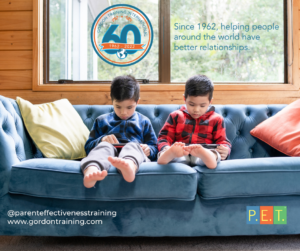Children are spending more time in front of screens than ever before and it’s important for parents to understand the effect and consequences. Screen Time = the amount of time spent in front of a screen or electronic media. It includes any sedentary activity in front of a screen such as:
- Watching television
- Working on the computer
- Playing video games
- Using a tablet or smartphone
Screen Time is a Worldwide Concern
- Adolescents are the most connected generation and according to a UNICEF survey, children under the age of 18 represent 1 in 3 Internet users worldwide.
- Average hours a day a child spends on a device? 8! That’s 2.5 hours more than it was over a decade ago according to the American Academy of Pediatrics.
- Children are learning how to use tech before they learn how to talk, walk, and tie their own shoes.
- 72% of teens and 48% of parents feel the need to respond immediately to texts, social media, messages, and other notifications.
- Half of the children aged 12-17 send or receive 60 or more text messages a day and an average of 34 texts a night after they get into bed.
How Can P.E.T. Help?
If you are a parent and are concerned with your child’s screen habits, here are some of the options offered in P.E.T.:
Modeling – Adults are affected by screen time as well, but they also have a better sense of self-control. Children learn by copying the behavior of the adults around them, so it’s important to be good role models. Example: Not having your phone out while you’re talking with your child or partner; maintain eye contact and use Basic and Active Listening skills.
Modifying the Environment – There are multiple ways you can modify the physical environment to prevent or minimize behavior that causes problems. Parents and children should seek mutual agreement before making physical changes. Example: The parents move TV out of view from the dining area; create separate room or area for TV, video games away from dining room or bedrooms.
Confrontive I-Messages – This is the message a parent sends to the child when the parent owns a problem (the child is doing or saying something unacceptable to the parent). It contains three parts: a non-blameful description of the specific behavior, the effects that the behavior is having on the parent, and the feeling the parent experiences due to the child’s behavior.
Example: “When I want to talk with you about our plans this weekend, I am really annoyed because you’re on your phone and not answering me or remembering what I just asked you.”
Method III Problem Solving – When people participate in making their rules, they are much more likely to follow them – this applies to children. A child is more motivated to follow the rules because they’re not handed down by the parent. Parent doesn’t need to enforce the rules. Child learns self-discipline and responsibility. Child is less resistant and rebellious. Solutions are more likely realistic in terms of both parent’s and child’s needs. Example: As a family you all sit down and talk about screen time during dinner and based on everyone’s needs, work out a solution that works for everyone.
Looking for a visual aid for this to share? Check out our Screen Time Infographic on our website.
Sources:
1. https://www.kff.org/other/report/generation-m2-media-in-the-lives-of-8-to-18-year-olds/
2. https://www.psychologytoday.com/us/blog/mental-wealth/201508/screentime-is-making-kids-moody-crazy-and-lazy
3. https://www.unicef.org/publications/files/SOWC_2017_ENG_WEB.pdf
4. https://www.parents.com/fun/entertainment/gadgets/is-technology-good-for-little-kids/
5. https://academic.oup.com/jpepsy/article/37/9/1023/890950
6. http://www.pewinternet.org/2018/08/22/how-teens-and-parents-navigate-screen-time-and-device-distractions/
7. https://www.upi.com/Study-Too-much-screen-time-increases-obesity-risk-for-children/7011533561344/
8. https://www.cnn.com/2016/05/03/health/teens-cell-phone-addiction-parents/
9. https://well.blogs.nytimes.com/2015/07/06/screen-addiction-is-taking-a-toll-on-children/
10. https://www.verywellfamily.com/the-negative-effects-of-too-much-screen-time-1094877
11. Epstein LH, Roemmich JN, Robinson JL, Paluch RA, Winiewicz DD, Fuerch JH, and Robinson TN. (2008) A Randomized Trial of the Effect of Reducing Television Viewing and Computer Use on Body Mass
Index in Young Children. Archives of Pediatrics & Adolescent Medicine. 162(3):239-245
12. https://www.cbsnews.com/news/resources-marketing-to-kids/
13. http://goodparentinc.com/wp-content/uploads/2014/10/UAFT_A_935684.pdf
14. https://www.researchgate.net/publication/295902618_Computer_vision_syndrome_aka_digital_eye_strain
15. Screenagers: growing up in the digital age, Delaney Ruston (writer, director, producer), MyDoc Productions, 2016, 67 min., https://www.screenagersmovie.com/
16. https://www.commonsensemedia.org/sites/default/files/uploads/research/2018_cs_socialmediasociallife_fullreport-final-release_2_lowres.pdf

